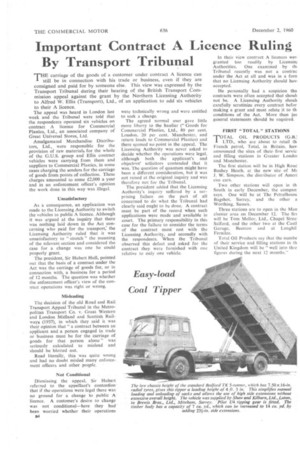Important Contract A Licence Ruling By Transport Tribunal
Page 38

If you've noticed an error in this article please click here to report it so we can fix it.
THE carriage of the goods of a customer under contract A licence can I still be in connection with his trade or business, even if they are consigned and paid for by someone else. This view was expressed by the
Transport Tribunal during their hearing of the British Transport Commission appeal against the grant by the Northern Licensing Authority to Alfred W. Ellis (Transport), Ltd., of an application to add six vehicles to their A licence.
The appeal was heard in London last week and the Tribunal were told that the respondents operated six vehicles on contract A licence for Commercial Plastics, Ltd., an associated company of Great Universal Stores, Ltd.
Amalgamated Merchandise Distributors, Ltd., were responsible for the provision of raw materials for the whole of the G.U.S. group and Ellis contract vehicles were carrying from them and suppliers to Commercial Plastics, in some cases charging the senders for the carriage of goods from points of collection. These charges amounted to some £2,000 a year and in an enforcement officer's opinion the work done in this way was illegal.
Unsatisfactory
As a consequence, an application was made to the Licensing Authority to switch the vehicles to public A licence. Although it was argued at the inquiry that there was nothing laid down in the Act concerning who paid for the transport: the Licensing Authority ruled that it was unsatisfactory to " stretch " the meaning of the relevant section and considered the case for a change was one he could properly grant.
The president, Sir Hubert Hull, pointed out that the basis of a contract under the Act was the carriage of goods for, or in connection with, a business for a period of 12 months. The question was whether the enforcement officer's view of the contract operations was right or wrong.
Misleading The decision of the old Road and Rail Transport Appeal Tribunal in the Metropolitan Transport Co. v. Great Western and London Midland and Scottish Railways (1937), in which they said it. was their opinion that "a contract between an applicant and a person engaged in trade or business must be for the carriage of goods for that person alone" was seriously calculated to mislead and should be blotted out.
Read literally, this was quite wrong and had no doubt misled many enforcement officers and other people.
Not Conditional Dismissing the appeal, Sir Hubert referred to the appellant's contention that if the operations were legal there was no ground for a change to public A licence. A customer's desire to change was not conditional—here they had been worried whether their operations D4 were technically wrong and were entitled to seek a change.
The agreed normal user gave little more liberty to the haulier (" Goods for Commercial Plastics, Ltd., 80 per cent. London, 20 per cent. Manchester, and return loads to Commercial Plastics) and there seemed no point in the appeal. The Licensing Authority was never asked to decide whether the operations were legal, although both the applicant's and objectors' solicitors contended that it was. The question of quantum might have been a different consideration, but it was not raised at the original inquiry and was therefore not for the Tribunal.
The president added that the Licensing Authority's inquiry suffered by a surprising failure on the part of all concerned to do what the Tribunal had clearly said ought to be done. A contract must be part of the record when such applications were made and available in court. The primary responsibility in this case for the failure to consider the terms of the contract must rest with the Licensing Authority, and secondly with the respondents. When the Tribunal observed this defect and asked for the contract they were furnished with one relative to only one vehicle. In their view contract A licences wer granted too readily by Licensim Authorities. One examined by th Tribunal recently was not a contrac under the Act at all and was in a forn that no Licensing Authority should hay accepted.
He personally had a suspicion the contracts were often accepted that shoull not be. A Licensing Authority shoull carefully scrutinize every contract befor making a grant and must relate it to th conditions of the Act. More than jus general statements should be required.
FIRST " TOTAL " STATIONS
TOTAL OIL PRODUCTS (G.B.', I LTD., who are about to retail th French petrol, Total, in Britain, hay announced the sites of theirfirst servic and filling stations in Greater Londm and Manchester.
The first station will be in High Roac Bushey Heath, at the new site of Mr J. W. Simpson, the distributor of Ameni can cars.
Two other stations will open in th South in early December, the compan says. One will be at The Petrolhousi Bagshot, Surrey, and the other a Worthing, Sussex.
Three stations are to open in the Man chester area on December 12. The firs will be Tom Mellor, Ltd., Chapel Stree Salford, and the other two at the Castl Garage. Beeston and at Longhil Fernilee.
Total Oil Products say that the numbe of their service and filling stations in th United Kingdom will be "well into thre figures during the next 12 months."




















































































































